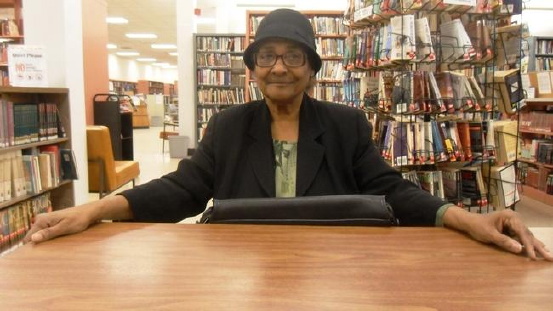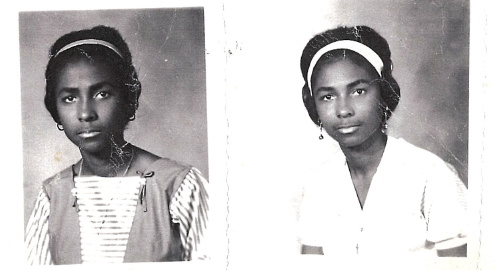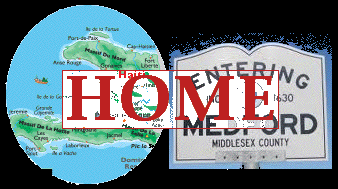 Josiane Bistoury tells her story Josiane Bistoury tells her story
Introduction by Nicholas Iovino
For the last few months, Medford resident Josiane Bistoury has proved crucial in helping storyteller Sharon Kennedy capture the oral histories of local Haitian people for her “Haitian Culture and Stories” project. Bistoury has not only connected Kennedy with local Haitians, but also served as translator for many interviews. Bistoury speaks multiple languages, including French, Creole, English and some Spanish.
Kennedy recently learned that Bistoury, too, has interesting tales to share about her life growing up in Haiti and the great milestones she has accomplished since arriving in the U.S.
Growing up in the Haitian capital of Port-au-Prince, Bistoury’s first job was working as a teacher in her mother’s Kindergarten class, which her mother ran out of their home. While there, Bistoury took it upon herself to teach uneducated maids how to read and write in her spare time, enabling those women to communicate with their families and loved ones far away in the countryside of Haiti.
 Bistoury was still a teenager when she left Haiti many decades ago. Before arriving in the U.S., she had already earned degrees in bookkeeping and accounting. After moving to the Boston area, she went on to earn a two-year degree from Northeastern University. She then worked on corporate accounts at State Street Bank before becoming an account controller at Cambridge Hospital. The Haitian native went on to work as executive director for the League of Haitian Families in Boston for six years and also worked as a translator for several local hospital systems, social service agencies and for the state government. Bistoury was still a teenager when she left Haiti many decades ago. Before arriving in the U.S., she had already earned degrees in bookkeeping and accounting. After moving to the Boston area, she went on to earn a two-year degree from Northeastern University. She then worked on corporate accounts at State Street Bank before becoming an account controller at Cambridge Hospital. The Haitian native went on to work as executive director for the League of Haitian Families in Boston for six years and also worked as a translator for several local hospital systems, social service agencies and for the state government.
The Medford resident still maintains close ties with the local Haitian community and is known among many Haitians in the area as the person they can count on for help in difficult times.
“What I know about Josiane is she is sort of the center of the community in a lot of ways,” said Kennedy. “She’s also the person you can count on to get a ride to the food pantry, the person you can count on if you need to get a package over to Haiti, or get a phone call to Haiti… If people need help, Josiane is there with help of whatever type is necessary.”
|
| Watch this interview with Josiane Bistoury |
The True Story of a Young Haitian Girl
as told to Sharon Kennedy
• Part One—Growing up in Haiti and coming to America in the 1960s
Josiane Bistoury was born in Port Au Prince and grew up and went to school in Port Au Prince. She finished high school early and at 18 years old was studying accounting.
Josiane Bistoury: But my father didn’t want me to have a job yet. And I couldn’t even mention marrying. I couldn’t even talk to a boy. If I talked too long with a boy, he would say, ‘Who is this boy? Who’s the mother? Who’s the father?
In Haiti it depends. It’s not like that for everyone. This is my experience. When I’m talking and I’m saying, ‘in Haiti,’ I don’t want someone to think I’m talking about Haiti like I own the place. No, people have different ways, different experiences. My father had seven kids. That may have been what made him so strict.
So I wanted to go to the United States then, when I was 18 years old. I couldn’t go unless I got permission from my Dad since I wasn’t 21. My father and I were very alike. We used to discuss and argue everything 24 hours a day. I looked just like my Dad and some people said I acted like him too. My mother was totally different, ‘Yes, sweetheart, yes sweetheart.’ But you know I loved them both.
I said to him, ‘I think it’s time to go.’ He said, ‘You’re not going anywhere.’ After that my girlfriend came back to Haiti from the U.S. on vacation. I said to her, ‘I can’t take it anymore. I can’t do anything. I can’t go to the movies. I can’t go visit a friend. My father won’t let me do anything.’
So I figured out how to get permission to go. My father was a lawyer and he was working at this building and I knew a lot of the people working with him. They all knew what was going on with me. I had told a lot of those people that I wanted to go to my girlfriend’s wedding in the United States. See these people knew the situation and they knew how my father was.
So I went to his office when I was sure everybody would be there for a meeting. I walked in and gave him the papers to sign while everybody was looking. In front of all of them, he signed! He gave me permission to go on vacation to America. As soon as he signed I ran out of there and brought the papers to the Embassy.
When my father got home that night he said, ‘Give me the paper!’ and I said, ‘I already took it to the Embassy.’ There was nothing he could do. He asked me where I would be staying and I told him with my girlfriend.I flew into New York even though my girlfriend lived in Boston. I thought Boston was just like 10 or 15 minutes outside of New York. Someone let me stay overnight at their apartment in New York and I took the train to Boston the next morning.
My friend sent this man to pick me up at the train and guess what? He was the one I married. He is the father of my two kids.
Sharon Kennedy: “You were quick, Josiane.”
Josiane Bistoury: “I am still quick!”
• Part Two—A life of helping other people
Josiane has had many careers including, in Boston, the career of a Haitian activist. However, in her personal life she also helps immigrants with many different kinds of things such as shopping, an occasional loan of money, phone calls to Haiti and shipping things to relatives in Haiti. We talked about the beginning of a life of helping other people.
Josiane Bistoury: But believe it or not, the things I am doing today I used to do when I was a young girl. I mean I was helping people since I was a kid. For example, there was a little girl from the countryside who came to Port au Prince and she was at our house. Her name was Arlene. She was probably 7 years old and she came, like many others, so she could go to school. People would give little jobs to girls like that — sweeping the floor, washing the dishes. This was common in Haiti. We had a servant already but these young boys and girls would come from the country and they would do whatever you needed. You could say, ‘Arlene, I need a glass of water, Arlene bring me the water...’ So they would be servants in someone’s house and you would give them room and board and they could go to school.
But my Dad said, shortly after Arlene arrived, ‘She is going back home to where she came. Listen! That girl is too young. What can she do for us? We’re sending her back home.' Guess what? I cried all night. Next morning my face was a mess. My Mom said, ‘Why are you crying so much?’ I said, ‘What’s she going to eat when she goes back home?’ Her family was so poor, she was from way out in the countryside. She would be going back to an impossible situation.
And another thing I should mention: she was singing. Singing church songs mostly, and dancing. Even now if someone is singing and dancing I want to go and see! I love it!
And guess what? My Dad woke up the next morning and he said, ‘Well, how can you help us if we keep her?’ I said, ‘I will take care of her before I go to school. I will make sure she eats, I will make sure she combs her hair , I make sure she goes and takes her bath.’ And so, she ended up staying with us! And my father said, ‘Who is going to buy clothes for her? She didn’t bring anything.’ I said ‘This one is no problem. I’m going to learn how to make little clothes. And I can do it. And we have a lot of clothes that we don’t use anymore. I will fix them so they will fit her.’ And I did! She had beautiful little clothes.
I was probably about 8 years old. I guess I was just a year older than she was. But I was tall and she was tiny. But beautiful, beautiful. I loved her! And I took care of her of her until I was 18 and I left Haiti. When I left the country Arlene was still staying with my Mom.
She learned to read but she didn’t finish high school. One day I let her go back to visit her family when she was almost grown up so they could see her and she could say, ‘Guess what? You see I left when I was little and here I am now.’
Maybe it was a mistake to let her go. Anyway she never came back. But she became a teacher there in the country. She was one of the few people there who could read. And she helped people at her church in many ways. From time to time I heard from her but now I should find out how she is. I still love her but I don’t know where she is right now. I have to find out if I can.
Here in the U.S. I have been a foster mother and I could show you the pictures. I have taken care of many children. And I’ve loved them all. |
